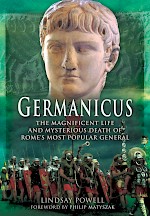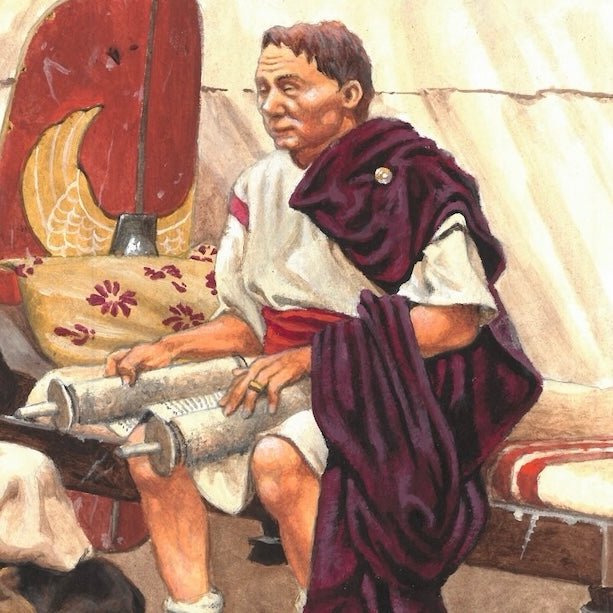The ultimate homicide case of ancient Rome?
 Editorial note: regular contributor Lindsay Powell’s book on Germanicus has recently been re-released in paperback form. Like we’ve done before, we’re giving Lindsay some space here to promote this new edition. As always, we don’t necessarily endorse this book.
Editorial note: regular contributor Lindsay Powell’s book on Germanicus has recently been re-released in paperback form. Like we’ve done before, we’re giving Lindsay some space here to promote this new edition. As always, we don’t necessarily endorse this book.
Tales of great men stabbed in the back by shady characters are sordid but fascinating aspects of human history. Philip of Macedon and Julius Caesar were struck down by assassins’ daggers far from the battlefield where they had spent their glorious careers in constant danger. Both events had profound and long term consequences for their countries.
In modern times too there have been political assassinations. The most famous occurred on 22 November 1963 when a president of the United States was shot in Dallas, Texas. Every year, on the anniversary, TV documentaries and newspaper articles about that fateful day appear in American media. People still alive who were around at the time can tell you where they were when they heard the news – what they call the ‘JFK moment’. It is part of the lore of the Land of the Free and the Home of the Brave. As I learned of the tragic story I was struck by the parallels, even similarities, with a much older case of a V.I.P’s death that has long been thought of as one of the great murder mysteries of the ancient world. Was it really – as was believed at the time – a political assassination?
I am referring to Germanicus Julius Caesar (16 BC–AD 19), about whom my biography has just been republished in paperback by Pen and Sword Books. Germanicus was the famous and well educated grandson of Caesar Augustus. He was widely regarded as Rome’s most popular military commander. When Augustus adopted Germanicus’ uncle Tiberius, who in turn adopted his nephew, he was marked out to be the third emperor of Rome.
Poised and handsome
Like John Fitzgerald Kennedy, the son of Rome was wildly popular during his lifetime. Poised, handsome, and descended from one of the nation’s great families, Germanicus married the Emperor’s beautiful but strong-willed granddaughter, Agrippina the Elder. As John and Jackie Kennedy were to the twentieth century, Germanicus and his wife were the glamorous couple of the first. They were feted by crowds wherever they went and he enthralled them with his oratory. He was an effective courtroom advocate, a poet and a playwright in Rome, but it was as a successful general in the forests of Germania where he beat the famous rebel Arminius (a.k.a ‘Hermann the German’) that he made his name and forged his reputation. JFK too had served his country during World War Two in the US Navy (he was assigned to the South Pacific as commander of a patrol torpedo boat, the PT-109) and served with distinction. He wrote about his wartime experiences in a bestseller, Profiles in Courage (which was awarded the Pulitzer Prize for biography in 1957).
For his victories across the Rhine River, in AD 17, the new Emperor Tiberius sent his adopted son to Syria as governor general to bring order to the eastern provinces. It was a fateful promotion. On 10 October AD 19 ancient Rome suffered its own ‘JFK moment’. Germanicus Caesar died mysteriously in Antioch, aged 34. His demise shook the very foundations of the Roman state. Initially people did not believe the reports, but once confirmed, shock gave way to tears, then rage. There were riots in the streets of Rome, which lasted months. The walls of public buildings were daubed with the words REDDE GERMANICUM – “Give us back Germanicus!”
The cause of his death has vexed historians for centuries. Hardly had Germanicus’ body gone cold when many already suspected murder. Just as a recent Associated Press-GfK poll (conducted April 2013) found that the majority of Americans still believe several gunmen were involved in the murder of the President of the United States in Dallas, the ancient Romans suspected that the death of their war hero and emperor-to-be was the victim of a political conspiracy and a cover-up. The earliest account we have was written by Josephus, who writes some seventy years after Germanicus’ death that the accepted view in his day was that he had been poisoned.
Just as Jackie Kennedy stoically nursed the heartbreak of her husband’s public death in 1963 and took his body to the nation’s capital, almost 2,000 years ago Agrippina mourned her own tragic loss. Having overseen the funeral rites in the marketplace in Antioch, she carried the urn containing his ashes herself back to Rome for burial. When she reached Italy people lined the docksides at Brindisi and the roadsides all the way to Rome out of respect. The American painter Benjamin West depicted the moment of her arrival in his famous painting of 1768, which now hangs at Yale University Art Gallery; and J.M.W. Turner created a visual fantasy of the same moment in his painting of 1839, now in The Tate, London.
Agrippina insisted that her husband’s death was murder. Fingers pointed at the governor of Syria, Calpurnius Piso, and, as a deputy of the Emperor, even at Tiberius himself. A year after Germanicus’ death Piso was put on trial by his fellow senators on charges of murder and treason. The senators met behind the closed bronze doors of the Senate House as the ordinary men and women of Rome outside loudly demanded justice. Before the process ended Piso was found dead, which only added to the mystery and suspicion. Piso was found guilty of treason, but the Senate rejected the notion of a conspiracy in Germanicus’ death. Its verdict – delivered on 10 December AD 20 – was accepted by most, but rejected by many, much like the Warren Commission Report of 1964. Significantly the Roman Senate itself was not convinced poison was the cause.
It may have been an accidental death, caused by a natural disease, perhaps made fatal by his medication, which in those days could be toxic if poorly prepared or taken in the wrong dosage. Germanicus had just returned from a long trip to Egypt to Syria. In the first century the East was a dangerous place for diplomats visiting from Rome. Particularly striking to me is that it is a matter of historical fact that in the 100 years following Germanicus’ death twenty-five high ranking Roman officials met their accidental ends in Syria, which they used as their headquarters for their missions in the eastern part of the empire. One of them was Emperor Trajan (AD 98–117), who was succeeded by Hadrian. They could not all have died by a conspirator’s hand.
Sometimes the historical truth of a mystery is mundane. People die for all sorts of reasons, most without ever a hint of a crime having taken place. If the brutal assassination of Jack Kennedy was “the ultimate homicide case” of modern times, Germanicus’ death was the unsolved mystery of the Roman world. Whether it is AD 19 or AD 1963, everyone loves an unsolved murder mystery.
A pivot point in history
One of the consistent conclusions of the many experts who have spoken of the killing of the thirty-fifth president is that it marked a pivot point in US History. Some have even called it “the day America lost its innocence”. For Romans too, the passing of Germanicus was a turning point. His premature death was a real setback. Tiberius’ rule became gradually more despotic, aided by his pathological deputy Aelius Sejanus, and many innocents died as a result.
Time is said to be a great healer, but it also allows memories to be become distorted. Jack Kennedy’s reputation has only gained with the passing of the years. Yet he ruled only a thousand days and saw little of his political agenda realised – it would be left to his successor, the Texan Lyndon Baines Johnson, to achieve that. His near canonical status and enduring popularity are, in large part, because he died before he could disappoint. Centuries earlier, Germanicus never came to power himself, but for the same reason his name remained untarnished after his death and people looked back at him fondly – neither of which could said of Tiberius.
The deeper tragedy is that Germanicus would likely have made a truly great emperor. If he had lived the history of Europe and the world would have taken a very different turn. Instead of Germanicus, his youngest son, Caius, later succeeded Tiberius as Rome’s third emperor. He is better known as Caligula.
If you’re interested, you can order Lindsay Powell’s Germanicus: The Magnificent Life and Mysterious Death of Rome’s Most Popular General at Amazon.




